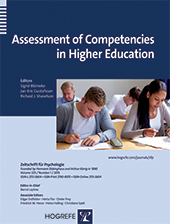Assessment of Mathematical Competencies and Epistemic Cognition of Preservice Teachers
Abstract
Assessment in higher education requires multifaceted instruments to capture competence structures and development. The construction of a competence model of preservice mathematics teachers’ mathematical abilities and epistemic beliefs allows for comparing different groups at different stages of their studies. We investigated 1st and 4th semester students with respect to their epistemic beliefs on the certainty of mathematical knowledge (assessed by both denotative and connotative judgments) and their mathematical abilities (defined as critical thinking with respect to mathematical problem situations). We show that students’ beliefs change during the first four semesters, and that the level of critical thinking does not depend on belief orientation but goes along with the level of sophistication of the epistemic judgments uttered by the students.
References
(2009). RUMM2030: Rasch unidimensional models for measurement. Perth, Australia: RUMM Laboratory.
(2011). Academically adrift. Limited learning on college campuses. Chicago, IL: University of Chicago Press.
(
in press ). Vernetzte Kompetenzen statt träges Wissen – Ein Studienmodell zur konsequenten Vernetzung von Fachwissenschaft, Fachdidaktik und Schulpraxis[A network of competencies instead of dull knowledge – a study model on the consistent interlinking of science, didactics, and teaching practice in schools] . In Lehren und Lernen von Mathematik in der Studieneingangsphase – Herausforderungen und Lösungsansätze. Berlin, Germany: Springer.(2013). Assessing strengths and weaknesses of teacher knowledge in Asia, Eastern Europe and Western countries: Differential item functioning in TEDS-M. International Journal of Science and Mathematics Education, 11, 795–817.
(2013). Modeling and measuring competencies in higher education. Rotterdam, The Netherlands: Sense.
(2015). Beyond dichotomies: Competence viewed as a continuum. Zeitschrift für Psychologie, 223, doi: 10.1027/2151-2604/a000194.
(2005). Thinking and knowing about knowledge – a plea for critical remarks on psychological research programs on epistemological beliefs. In , Activity and sign – grounding mathematics education (pp. 191–201). New York, NY: Springer.
(2008). Knowledge and epistemological beliefs: An intimate but complicate relationship. In , Knowing, knowledge and beliefs. Epistemological studies across diverse cultures (pp. 423–441). New York, NY: Springer.
(2008). Developing relational epistemology through relational pedagogy. In , Knowing, knowledge and beliefs. Epistemological studies across diverse cultures (pp. 405–422). New York, NY: Springer.
(2006). Examining the dual nature of epistemological beliefs. International Journal of Educational Research, 45, 28–42.
. (2012). The mathematical education of teachers II. Providence, RI: American Mathematical Society.
(2001). On the substance of sophisticated epistemology. Science Education, 85, 554–567.
(1985). The Ennis-Weir critical thinking essay test. Pacific Grove, CA: Midwest.
(1990). Critical thinking: A statement of expert consensus for purposes of educational assessment and instruction. [Executive Summary “The Delphi Report”]. Millbrae, CA: California Academic Press.
(2014). Modeling and measuring epistemic cognition: A qualitative re-investigation. Contemporary Educational Psychology, 39, 12–28.
(2008). Assessment of competencies in educational contexts: State of the art and future prospects. Göttingen, Germany: Hogrefe.
(2005). Effects of teachers’ mathematical knowledge for teaching on student achievement. American Educational Research Journal, 42, 371–406.
(2006). Beliefs about knowledge and knowing: Domain specificity and generality. Educational Psychology Review, 18, 67–76.
(1997). The development of epistemological theories: Beliefs about knowledge and knowing and their relation to learning. Review of Educational Research, 67, 88–140.
(2003). A perspective on judgment and choice. American Psychologist, 58, 697–720.
(2002). Representativeness revisited: Attribute substitution in intuitive judgment. In , Heuristics and biases: The psychology of intuitive judgment (pp. 49–81). New York, NY: Cambridge University Press.
(2002). The reflective judgment model: Twenty years of research on epistemic cognition. In , Personal epistemology: The psychology of beliefs about knowledge and knowing. Mahwah, NJ: Erlbaum.
(2004). The development of national educational standards – an expertise. Berlin, Germany: Bundesministerium für Bildung und Forschung (BMBF).
(1980). Mathematics: The loss of certainty. Oxford, UK: Oxford University Press.
(2010). Relativism. A contemporary anthology. New York, NY: Columbia University Press.
(2011). Critical thinking: A literature review. Upper Saddle River, NJ: Pearson Assessment. Retrieved from www.pearsonassessments.com/hai/images/tmrs/criticalthinkingreviewfinal.pdf
(2004). Personal epistemology and mathematics: A critical review and synthesis of research. Review of Educational Research, 74, 317–377.
. (2010). PISA 2009 assessment framework. Retrieved from www.oecd.org/pisa/pisaproducts/44455820.pdf.
(2014). “Is mathematical knowledge certain? – Are you sure?” An interview study to investigate epistemic beliefs. mathematica didactica, 37, 118–132.
(1985). Mathematical problem solving. Orlando, FL: Academic Press.
(1989). Explorations of students’ mathematical beliefs and behavior. Journal for Research in Mathematics Education, 20, 338–355.
(2003). How can we examine the connections between teachers’ world views and their educational practices? Issues in Education, 8, 217–227.
(2010). On the measurement of competency. Empirical Research in Vocational Education and Training, 2, 41–63.
(2011). The Generative nature of epistemological judgments: Focusing on interactions instead of elements to understand the relationship between epistemological beliefs and cognitive flexibility. In , Links between beliefs and cognitive flexibility – lessons learned (pp. 37–60). Dordrecht, The Netherlands: Springer.
(2007). The CAEB: An instrument for measuring connotative aspects of epistemological beliefs. Learning and Instruction, 17, 773–785.
(2002). The nature of teachers’ pedagogical content beliefs matters for students’ achievement gains: Quasi-experimental evidence from elementary mathematics. Journal of Educational Psychology, 94, 344–355.
(2010). A framework for critical thinking, rational thinking, and intelligence. In , Innovations in educational psychology: Perspectives on learning, teaching and human development (pp. 195–237). New York, NY: Springer.
(2014). How mathematicians obtain conviction: Implications for mathematics instruction and research on epistemic cognition. Educational Psychologist, 49, 36–58.
(2001). Concept of competence: A conceptual classification. In , Defining and selecting key competencies. Göttingen, Germany: Hogrefe.



